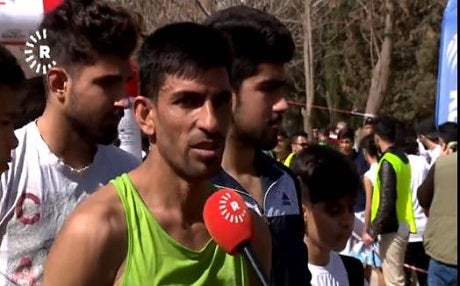After uprisings earlier in the same month in the cities of Raniya and Sulaimani, the spirit of revolution spread to Erbil on March 11, 1991.
A range of activities are taking place in Erbil in honor of the liberation of the Kurdistan Region capital from the ex-Baathist regime.
Some 1,300 runners took place in the 'Kurdistan Peace Marathon' on Sunday morning.
Runners are getting themselves ready for the marathon to kick off. Video: Rudaw
“Today is a sacred day. Today is the day of liberating Erbil. As Kurdistan Peace Marathon Organization, we launched our first activity on this day," Aram Khidir, organizer of the event, told Rudaw.
"A large number are participating in the marathon from both genders. More than 1,300 runners are taking part," he said.
Runners are competing to reach the Finish Line of the giant Kurdistan Peace Marathon. Rudaw video.
Foreigners are also taking part in the run, he added, as well as Iraqis from central and southern cities.
Sending a message of peace, Ali Ahmed, and Arab and member of Iraq’s national team from Kirkuk, crossed the finish line in first place in the 21km run.

"It was a very good and well-organized marathon... This is fifth time that I have taken part in marathons in Erbil,” he said.
The competition was “very good,” he said and attributed his success to hard work.
The winner of the 5km race said he was "thrilled" with his success.
"We are aiming to convey the message of peace to the world and Baghdad through this marathon in which we are a peaceful nation,” he said.
The uprising began on March 5, 1991 in the town of Raniya. It spread to Sulaimani on March 7, Erbil on the 11th, Duhok on the 14th, and culminated in Kirkuk on the 21st, coinciding with the Newroz festival.
During the two week civilian and Peshmerga campaign, Saddam Hussein's regime forces were ousted from the Kurdish cities.
A day before the Erbil uprising, the Kurdistan Front sent a message to Ibrahim Hakim, a prominent comedian actor from Erbil, calling on him to film people rising up against the Baathist regime with his camera.
The Kurdistan Front was an alliance of diverse political groups in Kurdistan in an effort to achieve unity among the Kurdish parties. It was announced in principle in July 1987 and formalized in May 1988 as the Iran-Iraq War was nearing its climax. It was initially formed between the Kurdistan Democratic Party (KDP) and the Patriotic Union of Kurdistan (PUK) and later six other smaller parties joined.
"They gave me a letter reading I was assigned to film the uprising of the Peshmerga forces and civilians in Erbil," Hakim recounted.
He said in the early hours of March 11, people started coming out of their houses. They were unarmed, carrying just sticks and canes to face the bullets of the Baathist regime.
"Unarmed people en masse, including women, men, and children carrying canes and sticks poured into the streets while I was filming on top of a roof as gunfire continued," Hakim recalled.
He followed the crowd of angry people with his camera downtown and by "no later than 1pm, the Baathist regime in Erbil was defeated."
March 11, 1970 Agreement
Sunday also marks the 48th anniversary of the March 11 Agreement.
The March 11 Agreement was reached between the Iraqi government and the Kurdish leadership under Mullah Mustafa Barzani after a decade of revolt against the regime in Baghdad.
The Aylul (September) Revolution broke out after negotiations between Kurds and Baghdad did not bear fruit in 1961 and the Iraqi government began a military campaign against the Kurds.
After a decade of armed struggle, the Iraqi government agreed to grant Kurds autonomy, but the agreement did not last long.
"Today marks the 48th year anniversary of the March 11, 1970 agreement between the Iraqi government and Kurdistan, an agreement which granted the Kurds some of their rights," Masoud Barzani, former president of the Kurdistan Region and son of Mullah Mustafa, said in a series of tweets.
“The March 11 agreement along with other legal agreements between Kurdistan and the central government in Baghdad culminated in the 2005 Iraqi Constitution. Alas, they have collectively failed to grant legitimacy to the concept of partnership," he added.
Over the past 48 years, Kurds have undergone a "systematic period of oppression" at the hands of the Baathist regime, Barzani continued.
"This duration of the past 48 years since that agreement has undergone a systematic period of oppression against the Kurds from chemical bombardment to the Anfal genocide. Unfortunately the government in Iraq continues to deliberately neglect the principle of partnership," Barzani said.



Comments
Rudaw moderates all comments submitted on our website. We welcome comments which are relevant to the article and encourage further discussion about the issues that matter to you. We also welcome constructive criticism about Rudaw.
To be approved for publication, however, your comments must meet our community guidelines.
We will not tolerate the following: profanity, threats, personal attacks, vulgarity, abuse (such as sexism, racism, homophobia or xenophobia), or commercial or personal promotion.
Comments that do not meet our guidelines will be rejected. Comments are not edited – they are either approved or rejected.
Post a comment